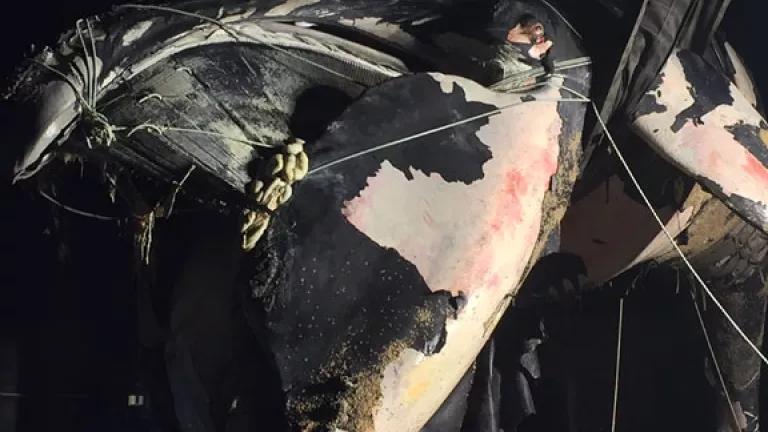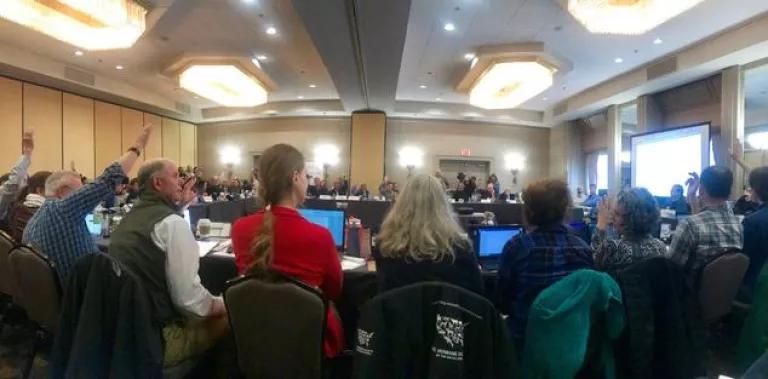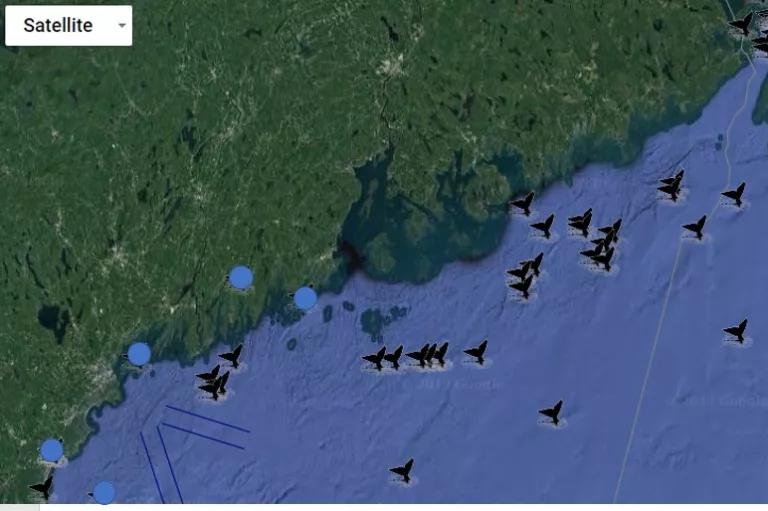Maine Delegation Moves to Block Right Whale Protections

Maine’s congressional delegation has sent a letter to President Trump asking him to block the efforts of the National Oceanic and Atmospheric Administration (NOAA) to develop new regulations intended to save the critically endangered North Atlantic right whale from extinction. The delegation is instead prioritizing the interests of the Maine lobster industry and Maine Governor Janet Mills has also expressed support for these efforts. This is a reckless and dangerous move by Senators Collins and King and Representatives Golden and Pingree that could spell the demise of New England’s iconic whale.
How concerned should I be about the North Atlantic right whale?
Only around 400 North Atlantic right whales are left and fewer than a quarter of those are breeding females. Eight whales have been found dead so far this year, representing two percent of the population, and we’ve lost at least 26 animals in a little over two years. It is now known that right whales are no longer dying from old age or natural causes—it is entirely because of human activities. At the current rate of decline we will lose our treasured right whales within just a few decades.
Entanglement in the vertical buoy lines used by lobster and crab pot and trap fisheries is the leading cause of the North Atlantic right whale’s decline. Entanglement can cause serious injuries or death by drowning. Whales may lose their ability to reproduce due to the stress of entanglement or may slowly starve to death as they drag heavy gear for months or even years. Between 2010 and 2016, 85 percent of right whale mortalities were related to entanglement and almost all surviving right whales (83 percent) have been entangled at least once. More than half have been entangled at least twice.
Why is the NOAA developing new regulations?
In developing new regulations to protect the right whale and end its decline, NOAA is fulfilling its obligations under federal law, specifically the Marine Mammal Protection Act and the Endangered Species Act.
NOAA’s goal is to reduce the risk of serious injuries and mortalities from entanglement by 60 percent. The 60 percent risk reduction target is the lower end of the 60-80 percent risk reduction target for U.S. fisheries that NOAA has established based on the best available scientific data. The 60 percent reduction must be met by NOAA as a bare minimum to comply with the Marine Mammal Protection Act.
How is NOAA developing the new regulations?
NOAA is working in consultation with the Atlantic Large Whale Take Reduction Team (TRT) to develop a suite of conservation measures to achieve the 60 percent risk reduction target. The TRT is a stakeholder group that includes fishermen, scientists, environmental groups, and state and federal agencies. NOAA has also asked individual state agencies to develop strategies to meet the 60 percent risk reduction target while ensuring the economic viability of their fisheries. The newly developed measures will then be considered by NOAA, along with input from the public, and subsequently incorporated into new federal regulations.
What input have Maine fisheries representatives had so far?
The Maine Lobstermen’s Association, the Maine Department of Marine Fisheries, and individual Maine lobstermen were fully engaged in the development of the conservation measures by the TRT through a series of in-person meetings and webinars spanning several months. Fisheries representatives from all the Northeastern states were engaged too and all of them on the TRT voted unanimously in support of the measures at the most recent TRT meeting in April 2019.
The Maine congressional delegation argues that the Maine representatives at the TRT meeting received “strong pressure” from NOAA to agree to the measures, largely out of fear they would be required to observe more stringent measures if they did not fall in line, or that NOAA would proceed without any input from the industry.
I personally observed the TRT meeting in April and the previous meeting in October 2018, and also attended several webinars. There was not one instance where I observed the Maine representatives receiving this type of pressure. In fact, there was a real sense of achievement in the room when the conservation measures were agreed to in April.

In line with my impression, Executive Director of the Maine Lobstermen’s Association, Patrice McCarron, expressed these optimistic words in a letter to their members shortly after the meeting:
“Maine now understands exactly what the lobster fishery has to do to comply with [NOAA’s] goal. The MLA will work with DMR and lobstermen on how best to remove 50% of our vertical lines from the water. The cuts are deep and the work will be extremely challenging. It will require us to rethink much of how our fishery is executed. But this approach gives lobstermen some flexibility to develop a broad set of techniques so that Maine’s diverse lobstering operations, both large and small, can remain viable.”
What evidence is there that Maine contributes towards right whale entanglement?
The Maine congressional delegation has also suggested that the state’s fisheries do not contribute to right whale entanglements. Yet, Maine has almost three million licensed traps and logic dictates the high density of vertical lines associated with those traps poses a significant risk of entanglement. An encounter between a whale and even a single vertical line can result in a deadly entanglement.
While it is true that the majority of recent deaths have occurred in Canada, right whales are still known to occur in Maine waters during their annual migration and multiple sightings have been made over the last five years in spite of reduced survey effort (see Figure 1). The western Gulf of Maine may also represent an increasingly important feeding area for the species, placing them increasingly in harm’s way of Maine’s fisheries in the future.

Importantly, it must also be noted that due to the previous actions of Maine’s congressional delegation, gear marking is not required in 70 percent of Maine’s waters. This makes it impossible to determine if a right whale became entangled in gear originating from a Maine fishery. The Maine delegation is using this convenient fact to argue that there is no evidence that Maine fisheries are causing entanglement of right whales. However, no information does not equal no entanglements. This argument simply does not hold in the absence of traceable evidence.
Considering the evidence, it is reasonable to assume that Maine fisheries are contributing to some extent to entanglements, and therefore serious injuries and mortalities, of right whales.
What do we need to do to save right whales from extinction?
Saving our right whales will require timely and significant action on both sides of the border. In the United States, it is vital that all northeastern states, including Maine, work with NOAA to develop strong and effective regulations capable of meeting the 60 percent risk reduction target. Maine’s fisheries representatives and state agencies have already agreed that this target reduction is achievable in ways that will not undermine the economic viability of fisheries or jeopardize the livelihoods of fishermen.
We ask that the Maine congressional delegation step up and work collaboratively with NOAA and the other northeastern states to protect this iconic species from being lost forever.


